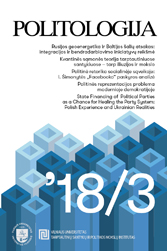RUSIJOS GEOENERGETIKA IR BALTIJOS ŠALIŲ ATSAKAS: INTEGRACIJOS IR BENDRADARBIAVIMO INICIATYVŲ REIKŠMĖ
RUSSIA COERCES, BUT THE BALTIC STATES PERSIST: THE IMPORTANCE OF INITIATIVES FOR INTEGRATION AND COOPERATION
Author(s): Arūnas Molis, Giedrius Česnakas, Justinas JuozaitisSubject(s): Energy and Environmental Studies, International relations/trade, EU-Accession / EU-DEvelopment, Geopolitics
Published by: Vilniaus universiteto leidykla & VU Tarptautinių santykių ir politikos mokslų institutas
Summary/Abstract: The infrastructural dependency of the Baltic States on Russia, even a quarter of a century after the collapse of the Soviet Union, has lead to technological dependence and the maintenance of relations between scientists, business groups and political decision-makers. All this has further strengthened Moscow’s tools in the area of energy geopolitics in the Baltic region. On the other hand, use of the so-called “punishment” instruments, intended to force other states to review their policies toward a Moscow leaning direction, has actually failed. Looking back, one may even say that the result was opposite: an aggressive Russian policy encouraged smaller countries to seek alternative supply routes, other partners and directions for integration. In this context, Lithuania may only appreciate that Moscow was not active enough in applying the positive instruments – offering preferential loans for the development of energy infrastructure, providing discounts for purchased resources etc. Namely these tactics would, in the long run, only increase the damage for Lithuania as an importer of energy resources. Thus, Russia’s pressure (primarily in the field of natural gas supply and pricing) did not force the Baltic States to act in accordance with its guidelines, for example, to refrain from criticizing the Nord Stream or postpone their integration into the network of Continental Europe.
Journal: Politologija
- Issue Year: 2018
- Issue No: 3 (91)
- Page Range: 3-47
- Page Count: 45
- Language: Lithuanian

